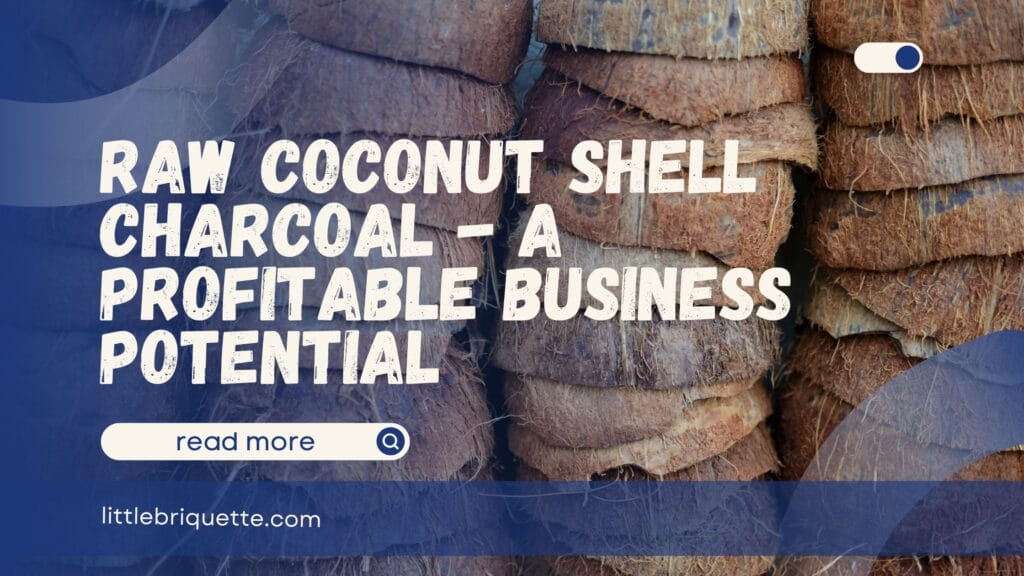Raw coconut shell charcoal is increasingly recognized as a raw material with significant potential across various industries. With the growing global trend towards sustainability and eco-friendliness, the demand for products made from natural raw materials like this continues to rise.
This charcoal is not only environmentally friendly, but it also presents promising business opportunities in both domestic and global markets. In this article, we will explore in detail how raw coconut charcoal can be a smart choice for starting a profitable business while contributing to the sustainability of our planet.
What is Raw Coconut Shell Charcoal?
Raw coconut shell charcoal is a type of charcoal produced by burning coconut shells through a carbonization process in the absence of oxygen. This process results in high-quality charcoal that has a longer heat retention and produces less smoke compared to charcoal from other sources. This type of charcoal is widely used in various industries, such as renewable energy, agriculture, cosmetics, and food products like BBQ briquettes. Its main advantage lies in its eco-friendly nature, as coconut shells are abundant natural waste materials that are easy to obtain, making it a sustainable option.
Reasons Why Natural Fuel is a Profitable Business Opportunity
Raw coconut charcoal presents a profitable business potential due to its abundant and inexpensive raw material—coconut shells, which are a byproduct of the growing coconut industry in tropical countries. Coconut-producing countries such as Indonesia, the Philippines, and India have a vast supply of coconut shells, making the cost of obtaining this raw material relatively low.
Additionally, the process of making raw coconut shell charcoal uses simple yet efficient technology, allowing entrepreneurs to start this business with a modest capital investment. With the increasing global demand, especially for eco-friendly products and renewable energy, raw coconut shell charcoal offers a wide and sustainable market opportunity, both domestically and internationally.
Read Also: Cooking with Charcoal Briquette, Techniques You Need to Know!
The Process of Making Raw Coconut Shell Charcoal
Raw coconut shell charcoal is produced through the following process:
- The production process begins with the selection of high-quality coconut shells.
- These shells are then cleaned and subjected to combustion in a closed furnace, where high temperatures and a lack of oxygen enable the carbonization process to occur, resulting in charcoal with a high porous structure.
- The produced charcoal is then cooled and sifted to ensure consistent size and quality.
It is important to note that compared to charcoal made from other raw materials, such as wood or palm oil, raw coconut shell charcoal has the advantage of higher combustion efficiency and lower carbon emissions. Additionally, its production process is more environmentally friendly because it utilizes abundant coconut waste, reducing dependence on other natural resources.
Market Potential and Global Demand
As global awareness of sustainability and reducing carbon footprints grows, the demand for eco-friendly products is increasing rapidly. Raw coconut charcoal, made from natural coconut waste, has become a key choice in markets that prioritize environmentally-friendly solutions. Below is a detailed explanation of the growing market potential and global demand for this product.
Trends in Raw Coconut Shell Charcoal Demand

Many countries are now focusing on the development of renewable energy and alternative fuels, making raw coconut shell charcoal an increasingly attractive source of energy that is more efficient and cleaner compared to traditional charcoal or fossil fuels. In addition, industries that require greener fuel options, such as the food and cosmetics industries, are also driving the rising global demand for this product.
The global market for eco-friendly products like raw coconut charcoal has significant potential. Countries in Europe, the Americas, and Asia are highly interested in products that can help support their sustainability goals.
In the renewable energy industry, raw coconut charcoal is used as a biomass fuel to replace fossil fuels, while in agriculture, it serves as an organic fertilizer that improves soil quality. With growing consumer concern about the environment and increasingly stringent regulations on carbon emissions, the demand for products like raw coconut shell charcoal is expected to continue rising in the coming years.
Business Opportunities in Natural Charcoal

The business opportunities in raw coconut shell charcoal are vast, especially in international markets that increasingly prioritize sustainability. Countries with rapidly growing renewable energy industries, such as Germany and Japan, have shown high interest in this product as an alternative energy source.
On the other hand, domestic markets in coconut-producing countries like Indonesia, the Philippines, and India can take advantage of the abundant raw materials to meet the growing global demand. Entrepreneurs can explore various sectors that use raw coconut charcoal, including energy, agriculture, cosmetics, and the food industry—each offering profitable market opportunities.
Additionally, regulations that support eco-friendly products open up even greater business prospects. Governments in many countries are offering incentives to companies focusing on renewable energy solutions and carbon emission reduction, making raw coconut shell charcoal an increasingly attractive option.
For entrepreneurs, this presents an opportunity to capitalize on the global sustainability trend while building a business that is not only profitable but also positively impacts the environment. By expanding into international markets and establishing partnerships with exporters, the raw coconut shell charcoal business can experience rapid growth on a global scale.
Export Advantages

Raw coconut charcoal is in high demand abroad, particularly in regions like Europe, America, and Asia, which are known for their strong commitment to sustainability and carbon emission reduction. In Europe, for example, many countries rely on biomass fuels as an alternative renewable energy source, and charcoal of this type has become one of their key choices.
The export potential of raw coconut charcoal comes not only from developed countries but also from emerging markets that are increasingly prioritizing eco-friendly products. As awareness grows regarding the importance of environmental preservation, this product is increasingly sought after to meet the needs of markets focused on green energy, waste management, and natural-based products.
Exporting raw coconut charcoal offers significant opportunities for businesses to access international markets with high profit margins, given the increasing demand and the abundant supply of raw materials in coconut-producing countries.
Read Also: Production Process & Advantages of Upgraded Coconut Charcoal
Genuine Raw Coconut Shell Charcoal Factory from Indonesia
Using eco-friendly fuel is essential to protect the Earth from global warming and its potential negative impacts. Therefore, it is important to choose pure coconut charcoal briquettes, produced by Little Briquette, a factory in Indonesia known for delivering the highest quality products. Contact Little Briquette via the admin number here and start benefiting from their products!

